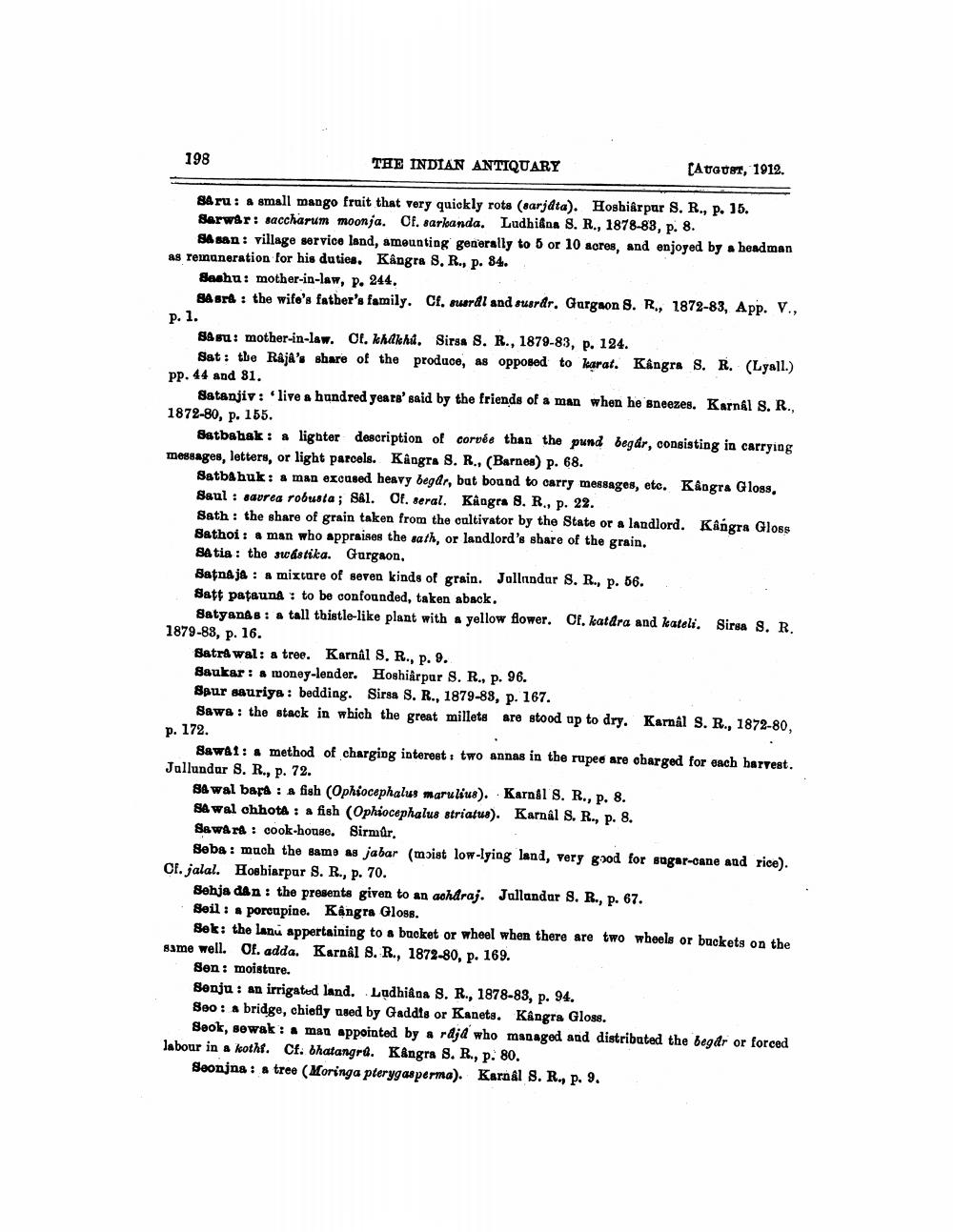________________
198
THE INDIAN ANTIQUARY
[AUGUST, 1912.
Saru: a small mango fruit that very quickly rots (sarjata). Hoshiarpur S. R., p. 15. Sarwar: saccharum moonja. Cf. sarkanda. Ludhiana S. R., 1878-83, p. 8.
Sasan: village service land, ameunting generally to 5 or 10 acres, and enjoyed by a headman as remuneration for his duties. Kângra S, R., p. 84.
Sashu: mother-in-law, p. 244.
Sasra: the wife's father's family. Cf. sueral and susrdr. Gurgaon S. R., 1872-83, App. V., p. 1.
Sirsa S. R., 1879-83, p. 124.
Sasu: mother-in-law. Cf. khakhu. Sat: the Raja's share of the produce, as opposed to karat. Kangra S. R. (Lyall.) pp. 44 and 81.
Satanjiv: live a hundred years' said by the friends of a man when he sneezes. Karnal S. R., 1872-80, p. 155.
Satbabak: a lighter description of corvée than the pund begár, consisting in carrying messages, letters, or light parcels. Kângra 8. R., (Barnes) p. 68.
Satbahuk: a man excused heavy begår, but bound to carry messages, etc. Kangra Gloss, Saul: saurea robusta; S&l. Of. seral. Kangra 8. R., p. 22.
Sath: the share of grain taken from the cultivator by the State or a landlord. Kangra Gloss Sathoi: a man who appraises the sath, or landlord's share of the grain.
Satia: the swastika. Gurgaon,
Satnaja: a mixture of seven kinds of grain. Jullandur S. R., p. 56.
Satt patauna: to be confounded, taken aback.
Satyanas: a tall thistle-like plant with a yellow flower. Cf. katara and kateli. Sirsa S. R. 1879-83, p. 16.
Satra wal: a tree. Karnal S. R., p. 9..
Saukar: a money-lender. Hoshiarpur S. R., p. 96.
Saur sauriya: bedding. Sirsa S. R., 1879-83, p. 167.
Sawa: the stack in which the great millets are stood up to dry. Karnal S. R., 1872-80, p. 172.
Sawai: a method of charging interest: two annas in the rupee are charged for each harvest. Jullundur 8. R., p. 72.
Sawal bara: a fish (Ophiocephalus marulius). Sawal chhota: a fish (Ophiocephalus striatus). Sawara: cook-house. Sirmûr,
Karnal S. R., P. 8.
Karnal S. R., p. 8.
Seba: much the same as jabar (moist low-lying land, very good for sugar-cane and rice). Cf. jalal. Hoshiarpur S. R., p. 70.
Sehja dan: the presents given to an achdraj. Jallandur S. R., p. 67.
Seil: a porcupine. Kangra Gloss.
Sek: the lanu appertaining to a bucket or wheel when there are two wheels or buckets on the same well. Of. adda. Karnal 8. R., 1872-80, p. 169.
Sen: moisture.
Senju: an irrigated land. Ludhiana S. R., 1878-83, p. 94.
Seo: a bridge, chiefly used by Gaddis or Kanets. Kângra Gloss.
Seok, sewak: a man appointed by a raja who managed and distributed the begår or forced labour in a kothf. Cf. bhatangrå. Kangra S. R., p. 80.
Seonjna: a tree (Moringa pterygasperma). Karnal S. R., p. 9.




